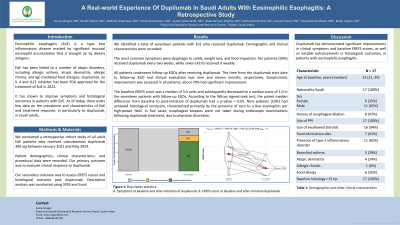Sunday Poster Session
Category: Esophagus
P0482 - A Real-World Experience of Dupilumab in Saudi Adults With Eosinophilic Esophagitis: A Retrospective Study
Sunday, October 27, 2024
3:30 PM - 7:00 PM ET
Location: Exhibit Hall E

Has Audio

Asma Alnajjar, MD
King Faisal Specialist Hospital and Research Centre
Riyadh, Ar Riyad, Saudi Arabia
Presenting Author(s)
Asma Alnajjar, MD, Muath Najmi, MD, Abdullah Alqaraawi, MD, Fahad Alsohaibani, MD, Aymen Almuhaidb, MD, Abdulrahman Alfadda, MD, Mohamed Ahmed, MS, Sameer Desai, PhD, Musthafa Peedikayil, MD, Bader Alajlan, MD
King Faisal Specialist Hospital and Research Centre, Riyadh, Ar Riyad, Saudi Arabia
Introduction: Eosinophilic esophagitis (EoE) is a type two inflammatory disease marked by significant mucosal eosinophil accumulation that is brought on by dietary antigens. EoE has been linked to a number of atopic disorders, including allergic asthma, atopic dermatitis, allergic rhinitis, and IgE-mediated food allergies. Dupilumab, an IL 4 and IL13 inhibitor, has been FDA approved for the treatment of EoE in 2022. It has shown to improve symptoms and histological outcomes in patients with EoE. As of today, there exists few data on the prevalence and characteristics of EoE and treatment response, in particularly to dupilumab, in Saudi adults.
Methods: We conducted a retrospective cohort study of all adult EoE patients who received subcutaneous dupilumab 300 mg between January, 2021 and May, 2024. Patient demographics, clinical characteristics, and procedural data were recorded. Our primary outcome was to evaluate clinical response to dupilumab. Our secondary outcome was to assess EREFS scores and histological outcome post dupilumab. Descriptive analysis was conducted using SPSS and Excel.
Results: We identified a total of seventeen patients with EoE who received dupilumab. Demographic and clinical characteristics were recorded. The most common symptoms were dysphagia to solids, weight loss, and food impaction. Ten patients (59%) received dupilumab every two weeks, while seven (41%) received it weekly. All patients underwent follow-up EGDs after receiving dupilumab. The time from the dupilumab start date to follow-up EGD and clinical evaluation was nine and eleven months, respectively. Symptomatic improvement was assessed in all patients; about 70% had significant improvement. The baseline EREFS score was a median of 3.0 units and subsequently decreased to a median score of 1.0 in the seventeen patients with follow-up EGDs. According to the Wilcox signed-rank test, the paired median difference from baseline to post-initiation of dupilumab had a p-value < 0.05. Nine patients (53%) had achieved histological remission, characterized primarily by the presence of zero to a few eosinophils per high-power field. In five cases, esophageal biopsies were not taken during endoscopic examinations following dupilumab treatment, due to physician discretion.
Discussion: Dupilumab has demonstrated significant improvements in clinical symptoms and baseline EREFS scores, as well as notable enhancements in histological outcomes, in patients with eosinophilic esophagitis.

Note: The table for this abstract can be viewed in the ePoster Gallery section of the ACG 2024 ePoster Site or in The American Journal of Gastroenterology's abstract supplement issue, both of which will be available starting October 27, 2024.
Disclosures:
Asma Alnajjar, MD, Muath Najmi, MD, Abdullah Alqaraawi, MD, Fahad Alsohaibani, MD, Aymen Almuhaidb, MD, Abdulrahman Alfadda, MD, Mohamed Ahmed, MS, Sameer Desai, PhD, Musthafa Peedikayil, MD, Bader Alajlan, MD. P0482 - A Real-World Experience of Dupilumab in Saudi Adults With Eosinophilic Esophagitis: A Retrospective Study, ACG 2024 Annual Scientific Meeting Abstracts. Philadelphia, PA: American College of Gastroenterology.
King Faisal Specialist Hospital and Research Centre, Riyadh, Ar Riyad, Saudi Arabia
Introduction: Eosinophilic esophagitis (EoE) is a type two inflammatory disease marked by significant mucosal eosinophil accumulation that is brought on by dietary antigens. EoE has been linked to a number of atopic disorders, including allergic asthma, atopic dermatitis, allergic rhinitis, and IgE-mediated food allergies. Dupilumab, an IL 4 and IL13 inhibitor, has been FDA approved for the treatment of EoE in 2022. It has shown to improve symptoms and histological outcomes in patients with EoE. As of today, there exists few data on the prevalence and characteristics of EoE and treatment response, in particularly to dupilumab, in Saudi adults.
Methods: We conducted a retrospective cohort study of all adult EoE patients who received subcutaneous dupilumab 300 mg between January, 2021 and May, 2024. Patient demographics, clinical characteristics, and procedural data were recorded. Our primary outcome was to evaluate clinical response to dupilumab. Our secondary outcome was to assess EREFS scores and histological outcome post dupilumab. Descriptive analysis was conducted using SPSS and Excel.
Results: We identified a total of seventeen patients with EoE who received dupilumab. Demographic and clinical characteristics were recorded. The most common symptoms were dysphagia to solids, weight loss, and food impaction. Ten patients (59%) received dupilumab every two weeks, while seven (41%) received it weekly. All patients underwent follow-up EGDs after receiving dupilumab. The time from the dupilumab start date to follow-up EGD and clinical evaluation was nine and eleven months, respectively. Symptomatic improvement was assessed in all patients; about 70% had significant improvement. The baseline EREFS score was a median of 3.0 units and subsequently decreased to a median score of 1.0 in the seventeen patients with follow-up EGDs. According to the Wilcox signed-rank test, the paired median difference from baseline to post-initiation of dupilumab had a p-value < 0.05. Nine patients (53%) had achieved histological remission, characterized primarily by the presence of zero to a few eosinophils per high-power field. In five cases, esophageal biopsies were not taken during endoscopic examinations following dupilumab treatment, due to physician discretion.
Discussion: Dupilumab has demonstrated significant improvements in clinical symptoms and baseline EREFS scores, as well as notable enhancements in histological outcomes, in patients with eosinophilic esophagitis.

Figure: Figure 1: Descriptive statistics: A. Symptoms at baseline and after initiation of dupilumab. B. EREFS score at baseline and after initiation dupilumab
Note: The table for this abstract can be viewed in the ePoster Gallery section of the ACG 2024 ePoster Site or in The American Journal of Gastroenterology's abstract supplement issue, both of which will be available starting October 27, 2024.
Disclosures:
Asma Alnajjar indicated no relevant financial relationships.
Muath Najmi indicated no relevant financial relationships.
Abdullah Alqaraawi indicated no relevant financial relationships.
Fahad Alsohaibani indicated no relevant financial relationships.
Aymen Almuhaidb indicated no relevant financial relationships.
Abdulrahman Alfadda indicated no relevant financial relationships.
Mohamed Ahmed indicated no relevant financial relationships.
Sameer Desai indicated no relevant financial relationships.
Musthafa Peedikayil indicated no relevant financial relationships.
Bader Alajlan indicated no relevant financial relationships.
Asma Alnajjar, MD, Muath Najmi, MD, Abdullah Alqaraawi, MD, Fahad Alsohaibani, MD, Aymen Almuhaidb, MD, Abdulrahman Alfadda, MD, Mohamed Ahmed, MS, Sameer Desai, PhD, Musthafa Peedikayil, MD, Bader Alajlan, MD. P0482 - A Real-World Experience of Dupilumab in Saudi Adults With Eosinophilic Esophagitis: A Retrospective Study, ACG 2024 Annual Scientific Meeting Abstracts. Philadelphia, PA: American College of Gastroenterology.
